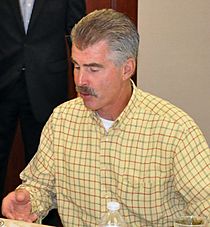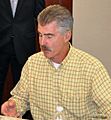Bill Buckner facts for kids
Quick facts for kids Bill Buckner |
|||
|---|---|---|---|
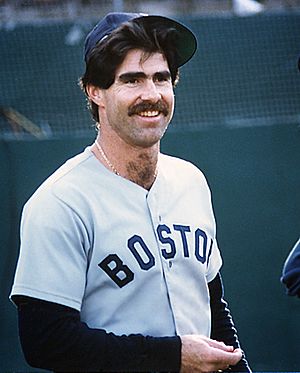
Buckner with the Boston Red Sox
|
|||
| First baseman / Outfielder | |||
| Born: December 14, 1949 Vallejo, California, U.S. |
|||
| Died: May 27, 2019 (aged 69) Boise, Idaho, U.S. |
|||
|
|||
| debut | |||
| September 21, 1969, for the Los Angeles Dodgers | |||
| Last appearance | |||
| May 30, 1990, for the Boston Red Sox | |||
| MLB statistics | |||
| Batting average | .289 | ||
| Hits | 2,715 | ||
| Home runs | 174 | ||
| Runs batted in | 1,208 | ||
| Teams | |||
|
|||
| Career highlights and awards | |||
|
|||
William Joseph Buckner (December 14, 1949 – May 27, 2019) was an American first baseman and left fielder in Major League Baseball (MLB). He played for five different teams from 1969 to 1990. His most famous teams were the Chicago Cubs, Los Angeles Dodgers, and Boston Red Sox.
Buckner started his career as an outfielder with the Dodgers. He helped them reach the 1974 championship with a strong batting average. After an ankle injury, he moved to the Cubs in 1977. There, he became a first baseman and won the National League (NL) batting title in 1980. He was also an All-Star in 1981. Buckner set a major league record for first basemen with 159 assists in 1982, then broke his own record with 161 assists in 1983.
He was traded to the Red Sox in 1984. In 1985, he played all 162 games and set another record with 184 assists. Near the end of the 1986 season, leg injuries slowed him down. His error in Game 6 of the 1986 World Series is one of baseball's most famous plays. Many fans linked it to a "curse" on the Red Sox. This led to years of fan anger and public teasing. Buckner handled it with grace. Red Sox fans welcomed him back after their 2004 World Series win.
Buckner played his last seasons with the California Angels, Kansas City Royals, and Red Sox. He became one of only 21 players to play in four different decades. He finished his career with 2,715 hits and 498 doubles. He batted over .300 seven times. He also had three seasons with over 100 runs batted in (RBI). Buckner led his league in assists four times. His 1985 mark is still an American League (AL) record. He retired with the fourth-most assists by a first baseman in MLB history. This is impressive since he didn't play first base regularly until he was 27. After playing, Buckner became a real estate developer in Idaho. He also coached several Minor League Baseball teams before retiring from baseball in 2014.
Contents
Early Life
Buckner was born in Vallejo, California. He grew up in nearby American Canyon. He and his brothers, Bob and Jim, and Jim's twin sister Jan, were raised by their parents, Leonard and Marie Katherine Buckner. His father passed away in 1966 when Bill was a teenager. His mother worked for the California Highway Patrol.
He graduated from Napa High School in 1968. He played on both the baseball and football teams. In football, he was a two-time All-State receiver. He also earned All-America honors twice.
As a baseball player at Napa High School, Buckner was amazing. He hit .667 in 1967 and .529 in 1968. He first thought about going to college at Stanford or USC. But he chose to play professional baseball instead.
The Los Angeles Dodgers picked Buckner in the second round of the 1968 baseball draft. His friend Bobby Valentine was the Dodgers' first-round pick. After signing, Buckner joined the Ogden Dodgers. He also briefly attended Los Angeles Valley College, USC, and Arizona State University.
Baseball Career
Minor Leagues (1968–1970)
Buckner started his professional career at age 18. He played for the Ogden Dodgers in 1968. He hit .344 with 4 home runs and 44 RBI in 64 games. His teammates included Bobby Valentine and Steve Garvey. Their manager was Tommy Lasorda.
In 1969, Buckner moved up quickly through the Dodgers' minor league teams. He played for four different teams that year. He hit well at every level. He was called up to the Dodgers late in the 1969 season at age 19. He made his first MLB appearance on September 21.
In 1970, Buckner spent April with the Dodgers. He got his first hit on April 8. But he was sent back to Triple-A Spokane. He played 111 games there under manager Lasorda. He hit .335 with 3 home runs and 74 RBI. Buckner played most of 1970 with a broken jaw. He was called back up to the Dodgers in September.
Los Angeles Dodgers (1971–1976)
Buckner became a starting player for the Dodgers in 1971. He played as their opening-day right fielder. He hit his first career home run on April 6. Buckner also played some first base for the Dodgers. In 1973, he started 87 games at first base. However, Steve Garvey became a great first baseman. So, Buckner moved to left field permanently.
Buckner was part of a big moment in baseball history on April 8, 1974. He was playing left field when Hank Aaron hit his record-breaking 715th home run. Buckner tried to catch it by climbing the fence. He also played in his first World Series that year. The Dodgers lost to the Oakland Athletics. Buckner hit .250 in the Series, including a home run.
During his time with the Dodgers, Buckner batted .289. He had 38 home runs and 277 runs batted in over 773 games.
Chicago Cubs (1977–1984)
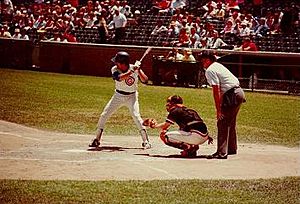
After the 1976 season, Buckner was traded to the Chicago Cubs. He had an infection in his ankle in 1976. So, the Cubs moved him to first base. He played this position for the rest of his career.
Buckner became a star for the Cubs. On May 17, 1979, in a high-scoring game, Buckner had a great day. He went 4-for-7 with a grand slam and a career-high seven RBI.
In 1980, Buckner won the NL batting title. He had a .324 batting average. He also rarely struck out. In 1981, he batted .311 and led the major leagues in doubles. He was the Cubs' only player in the All-Star Game. In 1982, Buckner batted over .300 again. He had a career-high 201 hits and 105 RBI. He also set a major league record for first basemen with 159 assists. In 1983, he led the NL in doubles again.
During the 1984 season, Buckner had some disagreements with the Cubs' management. He was not playing as much at first base. He was traded to the Boston Red Sox on May 25, 1984. In eight seasons with the Cubs, Buckner hit .300. He had 81 home runs, 235 doubles, and 516 RBI.
Boston Red Sox (1984–1987)
The Red Sox needed a better first baseman in 1984. They got Buckner from the Cubs. The Red Sox improved their record after the trade. On September 21, Buckner had his first five-hit game.
Buckner played in all 162 games for the Red Sox in 1985. He batted .299 with 16 home runs. He also had career highs with 110 RBI, 201 hits, and 46 doubles. He was known for making contact with the ball. He struck out only 36 times in 719 times at bat. In 1985, he also broke his own major league record for assists in a season with 184. This record stood for almost 25 years.
On June 5, 1986, Buckner got his 1,000th career RBI. He had another five-hit game on August 21. In September, he hit very well despite ankle soreness. He wore special high-top baseball cleats to help his ankles. That season, Buckner hit a career-high 18 home runs. He drove in over 100 runs for the second year in a row. He was a key player for the team that won the American League East. He helped the Red Sox win the American League pennant.
1986 World Series
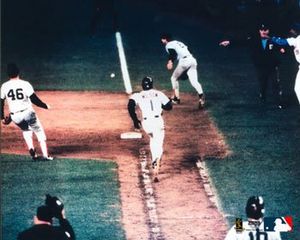
The 1986 Red Sox were leading the New York Mets 3 games to 2 in the 1986 World Series. Game 6 went into extra innings. Buckner had not been hitting well in the Series. In the bottom of the tenth inning, the Red Sox were ahead by two runs. Boston's manager decided to keep Buckner in the game at first base.
With two outs and no one on base, the Mets scored two runs to tie the game. Then, Mookie Wilson hit a slow ground ball toward Buckner at first base. Buckner tried to hurry the play. The ball went to the left side of his glove, through his legs, and into the outfield. This allowed the winning run to score from second base. If Buckner had fielded the ball, the game would have continued into the 11th inning.
The Red Sox lost Game 7 as well. The Mets won the World Series.
Aftermath
Many Red Sox fans blamed Buckner's error for the team's loss. He became a target for angry fans. He was booed by some of his own home fans. Fans of other teams also teased him. He made his 2,500th career hit on May 19, 1987. But the Red Sox released Buckner on July 23, 1987.
California Angels (1987–1988)
After leaving the Red Sox, Buckner signed with the California Angels. For the rest of the 1987 season, Buckner batted .306. He drove in 32 runs in 57 games. In total, he played 76 games with the Angels.
Kansas City Royals (1988–1989)
The Angels released Buckner in May 1988. He then signed with the Kansas City Royals. On July 15, he played against the Red Sox at Fenway Park for the first time as an opposing player. He had a hit off Roger Clemens.
In 168 games with the Royals, Buckner hit .239. He had 4 home runs and 50 RBI.
Second Red Sox Stint (1990)
Buckner returned to the Red Sox in 1990 as a free agent. He received a standing ovation from the crowd at the home opener on April 9.
Buckner's last home run was on April 25, 1990. It was an inside-the-park home run, which means he ran around all the bases. This was surprising because he was one of the slowest runners. He scored when an Angels outfielder crashed into the wall.
His return was short. He retired on June 5, 1990. In his career with Boston, Buckner hit .279. He had 48 home runs, 112 doubles, and 324 RBI.
Career Stats
Buckner was a fast baserunner early in his career. But ankle surgeries in 1975 and 1976 slowed him down. He twice finished in the top 10 in stolen bases. He also led the league in doubles twice. After moving to first base, he played 1,555 regular-season games. He made only 128 errors in almost 14,000 chances.
In 2,517 games over 22 seasons, Buckner batted .289. He had 2,715 hits, 1,077 runs scored, 498 doubles, 49 triples, and 174 home runs. He also had 1,208 RBI and 183 stolen bases. His on-base percentage was .321. Defensively, he had a .991 fielding percentage at first base and in the outfield.
Life After Baseball
After retiring from baseball, Buckner moved his family to Idaho. He invested in real estate in the Boise area. One of the neighborhoods he developed is named "Fenway Park."
On April 8, 2008, Buckner threw out the first pitch at the Red Sox home opener. This was when they showed off their 2007 World Series championship banner. He received a two-minute standing ovation from the crowd. He later said he had forgiven the media for how they treated him and his family.
In 2011, Buckner became the manager of the Brockton Rox baseball team. In 2012, he became the hitting instructor for the Boise Hawks. He announced his retirement from baseball on March 3, 2014. Buckner was inducted into the Napa High School Hall Of Fame in 1997. He was also inducted into the CIF Sac-Joaquin Section Hall of Fame in 2010.
Personal Life
Buckner and his wife Jody had two daughters, Brittany and Christen. They also had a son, Bobby. Bobby played baseball for the Texas A&M–Corpus Christi Islanders.
Death
Buckner passed away on May 27, 2019, at age 69. He died from a serious illness called Lewy body dementia. His wife Jody and three children were with him.
His family said, "Bill fought with courage and grit as he did all things in life." Buckner's funeral service was held in Boise, Idaho.
See also
- List of Major League Baseball career hits leaders
- List of Major League Baseball career doubles leaders
- List of Major League Baseball career runs batted in leaders
- List of Major League Baseball career runs scored leaders
- List of Major League Baseball batting champions
- List of Major League Baseball annual doubles leaders
- List of Major League Baseball players who played in four decades
Images for kids
 | Delilah Pierce |
 | Gordon Parks |
 | Augusta Savage |
 | Charles Ethan Porter |


